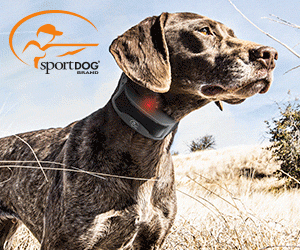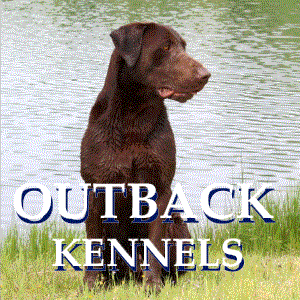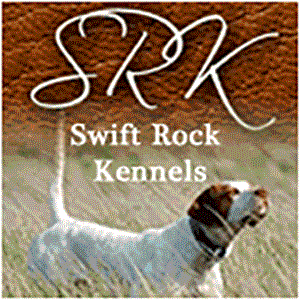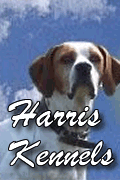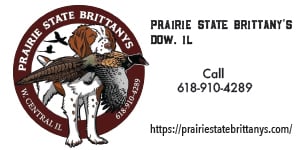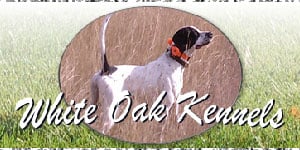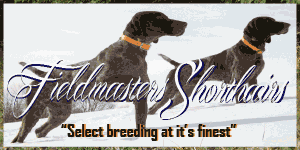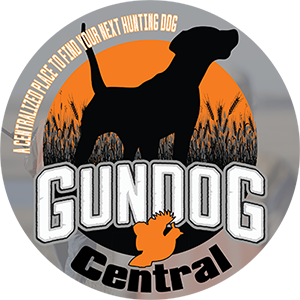Breeding a Better Dog
Posted 05/05/2010
A pair of wood ducks came screaming by as my dad and I folded the drake. Most likely my dad did the folding, but I tried to help with my single shot 20 gauge. He pulled our springer/lab cross and myself through the cattails and marsh grass searching for the drake.
I told my dad we needed to get ourselves a better dog.
That was 18 years ago and I am still looking. I have had several dogs that I would consider the "dog of a lifetime." Jodi and I start, and sell, about five pups a year, keeping one out of 10. We train full time, which gives us the opportunity to constantly evaluate our dogs and other breeders' dogs. We handle pointing dogs in hunt tests and train some field trial dogs, which gives us the opportunity to compare and contrast pointing dogs.
I have bought and started countless pups over the years, searching for the best. I believe one of the most important parts of breeding a better bird dog is selecting superior individuals. Talented dogs will have a better chance of ‘throwing' talented dogs. This is hard to do if you do not have a large enough sample to choose from.
WHAT ARE YOU BREEDING FOR?
First, you have to answer the question: What is a better bird dog? There are a lot of different opinions on this. Some people like a hard charging dog and some don't. We like a dog with a lot of drive that handles easily. We like a dog that wants to please, with a high degree of natural ability.
Some dogs are just naturally better bird dogs.
In versatile pointing dogs, abilities we look for include natural pointing, retrieving, honoring, a good nose, bird finding talent, prey drive, and water drive. These things come naturally to some dogs. We have trained some dogs that look better in their first session than others do after a month of training.
IMPORTANCE OF PEDIGREE
Pedigrees are very important. Look for MH (Master Hunter), SH (Senior Hunter), FC (Field Champion), AFC (Amateur Field Champion), and DC (Dual Champion). These titles are earned by top pointers and retrievers. They give breeders and trainers a way to enter their dogs in competition and emerge with recognized credentials.
Just make sure you don't place too much trust in titles alone, when deciding whether any given dog would be likely to ‘throw' quality puppies. These titles do not always mean you are getting a better dog. Some people will spend quite a bit of money and time to ‘title' a dog that does not always deserve that title.
Some dogs find birds very well, and some do not. Some do not have the ability and some do not have the drive. When it comes to pointing dogs, one has to be careful with field trials, which award the titles FC, AFC, and DC. These trials are becoming more and more based on run. There are definitely some nice trial dogs we have trained that I would love to hunt with. There are also those that run mainly to run, and not to hunt. We have trained some trial dogs that run all over the place, but go past countless birds before they find one.
Pointing dog hunt tests judge a dog more on ‘hunting ability,' and the tests are set up to measure skills much closer to how the average person actually hunts. At hunt tests, dogs are judged on hunting, bird-finding ability, pointing, trainability, retrieving, and honoring.
A dog that scores well in that kind of competition would make a pretty good pheasant dog, and a dog that is a pleasure to hunt over. But, again, you have to be careful about blindly assuming that all dogs bearing hunt test titles are deserving of those titles. We have trained some dogs at the master level that I am positive could not find a wild bird. We have also trained some extremely nice master dogs that would be hard to beat in the field.
IT TAKES MORE THAN A PEDIGREE
Both these games (field trials and hunt tests), as imperfect as they might be, give us a way to compare our dogs to others, and they do help us choose parents for prospective breedings. Still, the real test of any bird dog is in actual hunting situations with wild birds. Does your dog put more birds in the bag, and is he or she enjoyable to hunt behind? If the dog does not retrieve, we lose birds. If it points too close to the birds, some will be bumped out of gun range. If your dog does not honor the other dog and steals points, the birds may be flushed out of gun range.
Probably as big a deal as anything is whether your dog is blessed with the talent and drive to go out there and find birds. If the dog can't find birds, we cannot shoot them. If he does not work hard and smart, we won't find as many birds as we would with a harder-working, more intelligent dog.
For breeders and trainers, this search for consistently talented, intelligent, trainable dogs is a big focus of what we do. (Of course, we always strive to get the most out of any dog we take in to train, but it certainly helps the process along if you start with a dog that has the right stuff.)
Many people make the mistake of relying too heavily on pedigrees. I have seen many people breed dogs solely on pedigrees. We always start with a good pedigree, but evaluate each dog before breeding. I believe it takes a superior individual to throw superior individuals.
Many people believe that a dog is good just because it is a purebred, and that it could be even better if it were AKC registered. ‘Papers' only verify that your dog is purebred, not that it is, by virtue of pedigree alone, automatically a better bird dog than the neighbor's Shitzu.
SMART PAIRINGS PRODUCE GOOD PUPS
If you have a bitch that hunts well for you, and you would like to breed her, consider what traits would make her even better than she already is. That helps you see through your emotional attachment to the dog and spot her faults.
Plus, it helps you choose a breeding partner that can help offset those faults.
Find a dog to breed her with that excels at her faults. For example, if your female dog is a great hunter but very hard-headed, breed her to a male known for his trainability. Such a combination becomes more likely to produce puppies that are excellent hunters, yet very trainable and a joy to have around the house.
Be sure to consider other traits as well. Compare your dog to others. Most people think they have a wonderful dog. Why wouldn't they? They raised the dog, and are happy with it. This does not mean everyone else wants a dog with every trait your dog has.
Also, before breeding any given dog, be honest about its health. Is she, to the best of your knowledge, free from genetic defects? Hip Dysplasia is hereditary, so make sure she doesn't have it, or a history of it. Certify that her hips, eyes, and elbows are clean. Research her parents and make sure that they, too, are clean.
If you clear all these hurdles, and are honestly interested in breeding her, now you have to match her up with a male dog.
The question becomes: which male dog?
Stud dogs are plentiful. Not everyone is honest about their traits. Ask for references, go out and see the dog hunt. Is it a dog that you would be proud to own? Proud to say that he's the father of your pups? Some studs cost a bit of money to breed to. Like anything else in life, you often get what you pay for. But just because you pay a lot doesn't mean you're going to get the best. Go to trials and hunt tests to see the dogs run and hear what people say about them.
Remember to keep in mind the dominant traits of the female, and carefully observe the dominant traits of the male as you consider whether it would be a good breeding. Then, you'll be making a breeding decision based more on true potential than emotion. It doesn't always guarantee a litter of wonder pups, but it's the best system we have.
Intelligence, trainability, drive, natural bird-finding ability and more go into the making of a good hunting dog. Here, Chad Hines (left) and Jodi Ring work with a talented German Shorthair. In this article, Hines describes the process of choosing and breeding superior parents in an effort to produce consistently superior puppies.
I told my dad we needed to get ourselves a better dog.
That was 18 years ago and I am still looking. I have had several dogs that I would consider the "dog of a lifetime." Jodi and I start, and sell, about five pups a year, keeping one out of 10. We train full time, which gives us the opportunity to constantly evaluate our dogs and other breeders' dogs. We handle pointing dogs in hunt tests and train some field trial dogs, which gives us the opportunity to compare and contrast pointing dogs.
I have bought and started countless pups over the years, searching for the best. I believe one of the most important parts of breeding a better bird dog is selecting superior individuals. Talented dogs will have a better chance of ‘throwing' talented dogs. This is hard to do if you do not have a large enough sample to choose from.
WHAT ARE YOU BREEDING FOR?
First, you have to answer the question: What is a better bird dog? There are a lot of different opinions on this. Some people like a hard charging dog and some don't. We like a dog with a lot of drive that handles easily. We like a dog that wants to please, with a high degree of natural ability.
Some dogs are just naturally better bird dogs.
In versatile pointing dogs, abilities we look for include natural pointing, retrieving, honoring, a good nose, bird finding talent, prey drive, and water drive. These things come naturally to some dogs. We have trained some dogs that look better in their first session than others do after a month of training.
IMPORTANCE OF PEDIGREE
Pedigrees are very important. Look for MH (Master Hunter), SH (Senior Hunter), FC (Field Champion), AFC (Amateur Field Champion), and DC (Dual Champion). These titles are earned by top pointers and retrievers. They give breeders and trainers a way to enter their dogs in competition and emerge with recognized credentials.
Just make sure you don't place too much trust in titles alone, when deciding whether any given dog would be likely to ‘throw' quality puppies. These titles do not always mean you are getting a better dog. Some people will spend quite a bit of money and time to ‘title' a dog that does not always deserve that title.
Some dogs find birds very well, and some do not. Some do not have the ability and some do not have the drive. When it comes to pointing dogs, one has to be careful with field trials, which award the titles FC, AFC, and DC. These trials are becoming more and more based on run. There are definitely some nice trial dogs we have trained that I would love to hunt with. There are also those that run mainly to run, and not to hunt. We have trained some trial dogs that run all over the place, but go past countless birds before they find one.
Pointing dog hunt tests judge a dog more on ‘hunting ability,' and the tests are set up to measure skills much closer to how the average person actually hunts. At hunt tests, dogs are judged on hunting, bird-finding ability, pointing, trainability, retrieving, and honoring.
A dog that scores well in that kind of competition would make a pretty good pheasant dog, and a dog that is a pleasure to hunt over. But, again, you have to be careful about blindly assuming that all dogs bearing hunt test titles are deserving of those titles. We have trained some dogs at the master level that I am positive could not find a wild bird. We have also trained some extremely nice master dogs that would be hard to beat in the field.
IT TAKES MORE THAN A PEDIGREE
Both these games (field trials and hunt tests), as imperfect as they might be, give us a way to compare our dogs to others, and they do help us choose parents for prospective breedings. Still, the real test of any bird dog is in actual hunting situations with wild birds. Does your dog put more birds in the bag, and is he or she enjoyable to hunt behind? If the dog does not retrieve, we lose birds. If it points too close to the birds, some will be bumped out of gun range. If your dog does not honor the other dog and steals points, the birds may be flushed out of gun range.
Probably as big a deal as anything is whether your dog is blessed with the talent and drive to go out there and find birds. If the dog can't find birds, we cannot shoot them. If he does not work hard and smart, we won't find as many birds as we would with a harder-working, more intelligent dog.
For breeders and trainers, this search for consistently talented, intelligent, trainable dogs is a big focus of what we do. (Of course, we always strive to get the most out of any dog we take in to train, but it certainly helps the process along if you start with a dog that has the right stuff.)
Many people make the mistake of relying too heavily on pedigrees. I have seen many people breed dogs solely on pedigrees. We always start with a good pedigree, but evaluate each dog before breeding. I believe it takes a superior individual to throw superior individuals.
Many people believe that a dog is good just because it is a purebred, and that it could be even better if it were AKC registered. ‘Papers' only verify that your dog is purebred, not that it is, by virtue of pedigree alone, automatically a better bird dog than the neighbor's Shitzu.
SMART PAIRINGS PRODUCE GOOD PUPS
If you have a bitch that hunts well for you, and you would like to breed her, consider what traits would make her even better than she already is. That helps you see through your emotional attachment to the dog and spot her faults.
Plus, it helps you choose a breeding partner that can help offset those faults.
Find a dog to breed her with that excels at her faults. For example, if your female dog is a great hunter but very hard-headed, breed her to a male known for his trainability. Such a combination becomes more likely to produce puppies that are excellent hunters, yet very trainable and a joy to have around the house.
Be sure to consider other traits as well. Compare your dog to others. Most people think they have a wonderful dog. Why wouldn't they? They raised the dog, and are happy with it. This does not mean everyone else wants a dog with every trait your dog has.
Also, before breeding any given dog, be honest about its health. Is she, to the best of your knowledge, free from genetic defects? Hip Dysplasia is hereditary, so make sure she doesn't have it, or a history of it. Certify that her hips, eyes, and elbows are clean. Research her parents and make sure that they, too, are clean.
If you clear all these hurdles, and are honestly interested in breeding her, now you have to match her up with a male dog.
The question becomes: which male dog?
Stud dogs are plentiful. Not everyone is honest about their traits. Ask for references, go out and see the dog hunt. Is it a dog that you would be proud to own? Proud to say that he's the father of your pups? Some studs cost a bit of money to breed to. Like anything else in life, you often get what you pay for. But just because you pay a lot doesn't mean you're going to get the best. Go to trials and hunt tests to see the dogs run and hear what people say about them.
Remember to keep in mind the dominant traits of the female, and carefully observe the dominant traits of the male as you consider whether it would be a good breeding. Then, you'll be making a breeding decision based more on true potential than emotion. It doesn't always guarantee a litter of wonder pups, but it's the best system we have.
Intelligence, trainability, drive, natural bird-finding ability and more go into the making of a good hunting dog. Here, Chad Hines (left) and Jodi Ring work with a talented German Shorthair. In this article, Hines describes the process of choosing and breeding superior parents in an effort to produce consistently superior puppies.


